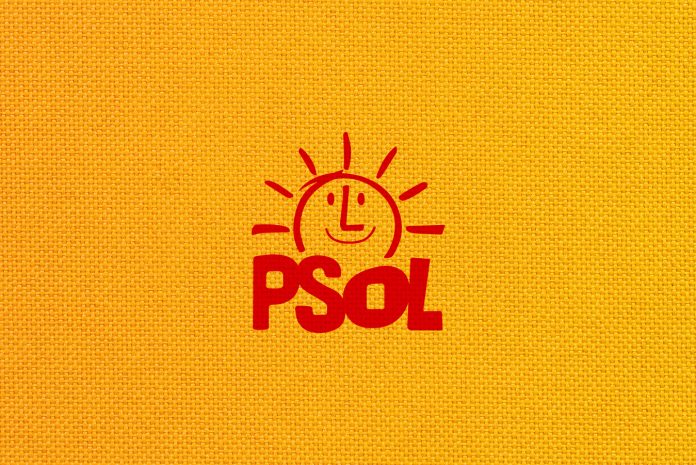Miguel Mendez – Chicago, IL (USA)
PSOL is a left-wing Brazilian party which was created in 2004, after four Congress representatives were expelled from PT (the Workers’ Party), for voting against the pension “reform” (an attack on pensions) proposed by president Lula (of PT), then on his first term in office. It was one of the first, and one of the biggest New Left Formations that came into being in the past period.
PSOL opposed many of Lula’s government policies, which were very similar to the neoliberal policies implemented by traditional bourgeois governments. PSOL also opposed PT alliances with right-wing politicians and parties. The name PSOL is the Portuguese abbreviation for “Socialism and Freedom Party”.
Since its foundation, PSOL has been attracting large numbers of activists, from the working class and different social movements, with the profile of having an independent anticapitalist agenda. Several revolutionary organisations are in PSOL (some since its foundation) and this party is the main organisation of the left outside PT, which should now be described as a centre-left party on the lines of traditional social-democratic parties.
PSOL’s full support and participation in Lula’s government
However, PSOL’s independent profile has been changing in the past years.
In the 2022 elections, PSOL decided not to launch a candidate for Presidency (for the first time in its history) and to support Lula from the first round, despite PT having built an even broader coalition than in the past, including mainstream factions of the Brazilian ruling class and imperialism.
That involved a fierce debate within the organisation (which ISp covered at least in part, and you can read it here). But that discussion lied on the tactical terrain. In the end, PSOL defended the vote for Lula (against the far-right incumbent Bolsonaro) from the first round.
However, PSOL decided also to join the official Bloc in support of Lula, which included several and important bourgeois and right-wing parties, and that was not agreed by the left Bloc within the party.
After the elections, it was very clear that Lula would make an even more conciliatory government than the previous four PT governments (2003-2016). And that the far-right, mainly expressed in the support for the defeated Bolsonaro (also called Bolsonarism) would remain alive in the political landscape. This became particularly clear in the January 8th 2023 developments, when a Brazilian version of Trump supporters’ assault on Capitol in the US took place.
Soon after the election results, and even before the government inauguration, the debate that took place in PSOL was how a left-wing party should face a class coalition government, and the strategy to effectively defeat the far-right. Unfortunately, PSOL decided to answer those questions in a way we have seen many times in history, and it never ended well.
In December 2022, PSOL decided to allow its members to take positions in Lula’s government and to take part in the official parliamentary Government Bloc (on which PSOL, now, has the Deputy Leader). PSOL members took important posts in several different Ministries, some of them led by bourgeois ministers. Those decisions were taken by a tiny margin of votes in the Party National Committee. Also, PSOL itself has a Minister in the Government, Sonia Guajajara, Minister of Indigenous People.
The PSOL official resolution says that the Party has no official participation in the government, that S. Guajajara is there simply as an individual. But her membership to the party was never suspended – and the party agreed to her taking the ministry. Just to make things absolutely clear, in an interview, when asked if there was a contradiction in being a Minister in a government where PSOL doesn’t take part, S. Guajajara answered:
“There’s no contradiction. I’m from PSOL and I’m a Minister… so PSOL is obviously part of this government”.
Recently, PSOL voted in the parliament for a Tax and Bill Reform, praised by the international financial markets.
That is a neoliberal reform, that the previous governments have been trying for decades to implement, and was widely celebrated by Brazilian and international business media. One PSOL Congresswomen, Taliria Petrone, declared that
“After 40 years of attempting, Lula’s government finally approved that historical reform”.
Apart from the three representatives of the left of PSOL, the representatives of all other parties in Congress voted for the neoliberal bill.
2024 Local Elections: Sao Paulo
In 2024, local elections will take place in all Brazilian states (except for the country capital city, Brasilia). These elections are an important political milestone, which marks the midterm of the Presidency and prepares the pollical landscape for the next year.
Instead of presenting itself on an independent and radical profile in these elections, unifying the left and the working class struggles and social movements under an anti-neoliberal and anti-capitalist agenda, PSOL decided to replicate the class coalition formula that took Lula to the presidency one year ago.
In Sao Paulo, the biggest city in the country, the PSOL candidate Guilherme Boulos is leading the polls, openly supported by Lula. Boulos has Martha Suplicy as his vice-mayor candidate. Martha
was a PT politician until the early 2010s but then she turned into a right-wing politician. She supported the constitutional Coup against Dilma (President of PT’s government at the time) in 2016 and voted for it as a Senator. Until very recently, Martha held a key position (equivalent to a minister) in the Sao Paulo local government – that was until the 9th of January, less than a week before the slate announcement. She is now standing against the same mayor that she used to serve from the secretarial post.

Besides the coalition itself, the profile of PSOL candidacy follows the same criteria. Boulos and the PSOL leadership employed a marketeer, identified with the right-wing and anti-popular campaigns, (a recent one being for the main food delivery company against the delivery workers’ organisation) to plan and run his campaign. Boulos has been adopting a moderated profile in his speeches, talking about consensus, and moving the campaign to the centre ground politically.
That level of commitment with the traditional elements of the Sao Paulo establishment, will make it impossible for Boulos, in case of winning the elections, to implement the necessary policies to change the working people’s lives, generating disappointment and paving the way for the far-right to dispute the anti-establishment narrative.
Two Blocs within PSOL
PSOL had its National Conference in December 2023, and there, two main blocs were consolidated in the party ranks.
The majority Bloc, also called PTL, is defending the PSOL participation in class coalition governments and extends that strategy to the 2024 local elections. That bloc has members in the national government and local governments and now controls most of the party structure.
There’s also a Left Bloc (called by that name) which advocates an independent and anti-capitalist PSOL. Despite being a minority in the party, the Left Bloc has important presence in the party structures and has the majority in some states. The Left Bloc was impacted by the decision of some groups and individual members to leave PSOL when it started its shift to the centre-ground. That initiative, so far, was not able to build any feasible alternative and weakened the important struggle within PSOL against its further capitulation to the government and the coalition strategy.
There was also another bloc, Semente, claiming to be a “third way”, but has always been voting with the majority (including decisive votes, as the ones explained above) and is officially part of PTL. They are now, especially after the last Conference, part of the majority of PSOL and also responsible for the direction the party is moving on.
Class conciliation does NOT defeat the far-right
Since the 1930s, with the rise of the far-right, particularly Nazism, in Europe before WW2, there has been a debate within the Left about how to respond to the far-right menace. The Stalinists and the Reformists defended the broad fronts and class coalition governments, with the “progressive” bourgeoisie (and even sections of the Imperialists) to, supposedly, isolate and defeat the fascists.
Trotsky, on his side, following the Bolshevik and Leninist traditions of the United Front, defended the opposite. He explained that the far-right germinates with the demoralization of the working class and the popular masses from the left organisations and the trade unions, when they see those as part of the establishment, and co-responsible for the deprived situation and crisis they are living in.
Therefore, we should establish united front actions between working class and other oppressed layers against the fascists, we should establish united struggles to defend our rights against the far-right attacks, but we must not be part of fronts with the ruling class, let alone take part in a bourgeois government. Such governments, especially in times of huge and global crisis like the one we see at present, cannot solve the problems of the working class and the oppressed; and the left and labour leaders have their hands tied by their alliance with the ruling class, leaving the doors widely opened to the far-right propaganda.
In 2024, the world is faced with a very complex situation, with an inter-imperialist dispute that escalates every month, a global economic crisis that is far from being solved, a climate catastrophe and social conditions worsening globally. The working class, the oppressed and popular layers, are responding: there are struggles, strikes and revolts all around the globe. But there’s also a far-right danger on the rise, with its reactionary agenda of racism, xenophobia, misogyny etc. We must learn the lessons of history, both from the 1930s and from recent experiences such as the one of SYRIZA in Greece. The majority of PSOL, unfortunately, seems to be following a similar path to that of SYRIZA.



